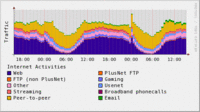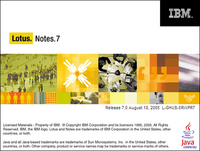
Promising unlimited access, not delivering, and refusing to admit it
is managing a network for the good of the many above the activities of the few?
Pete Abel thinks so:
Earlier this month, Comcast — the nation’s largest cable broadband
company — was caught doing what any good Internet Service Provider (ISP)
should do, i.e., manage its network to ensure that the online activities
of the few don’t interfere with the online activities of the many,
Fair vs. Foul in Net Neutrality Debate,
By Pete Abel,
The Moderate Voice,
24 November 2007
The problem with Comcast stifling BitTorrent by faking reset packets
from a participant is not that Comcast is trying to manage its network:
it’s that Comcast used a technique that if it came from anyone other
than an ISP would be considered malicious denial of service,
that Comcast still hasn’t admitted doing it,
and that Comcast bypassed numerous other methods
of legitimate network management,
such as those used by
PlusNet.
Comcast could even use the Australian model and
sell access plans that state usage limits and
throttle or charge or both for usage above those limits.
What Comcast is doing it seems to me is much closer to the
false advertising of unlimited access that got Verizon slapped down
for wrongful account termination.
The biggest problem with what Comcast (and
Cox, and AT&T, and Verizon)
are doing is that their typical customer has at most one or two choices,
which in practice means that if your local cable company and your local
telephone company choose to stifle, throttle, block, or terminate,
you have no recourse, because there’s nowhere to go.
Competition would fix that.
Abel tries to back up his peculiar interpretation of network management
with revisionist history:
Continue reading →
 The Economist
buys into
the telco propaganda about the Internet running out of bandwidth
and Marc Andreesen thoroughly fisks the article:
The Economist
buys into
the telco propaganda about the Internet running out of bandwidth
and Marc Andreesen thoroughly fisks the article:








